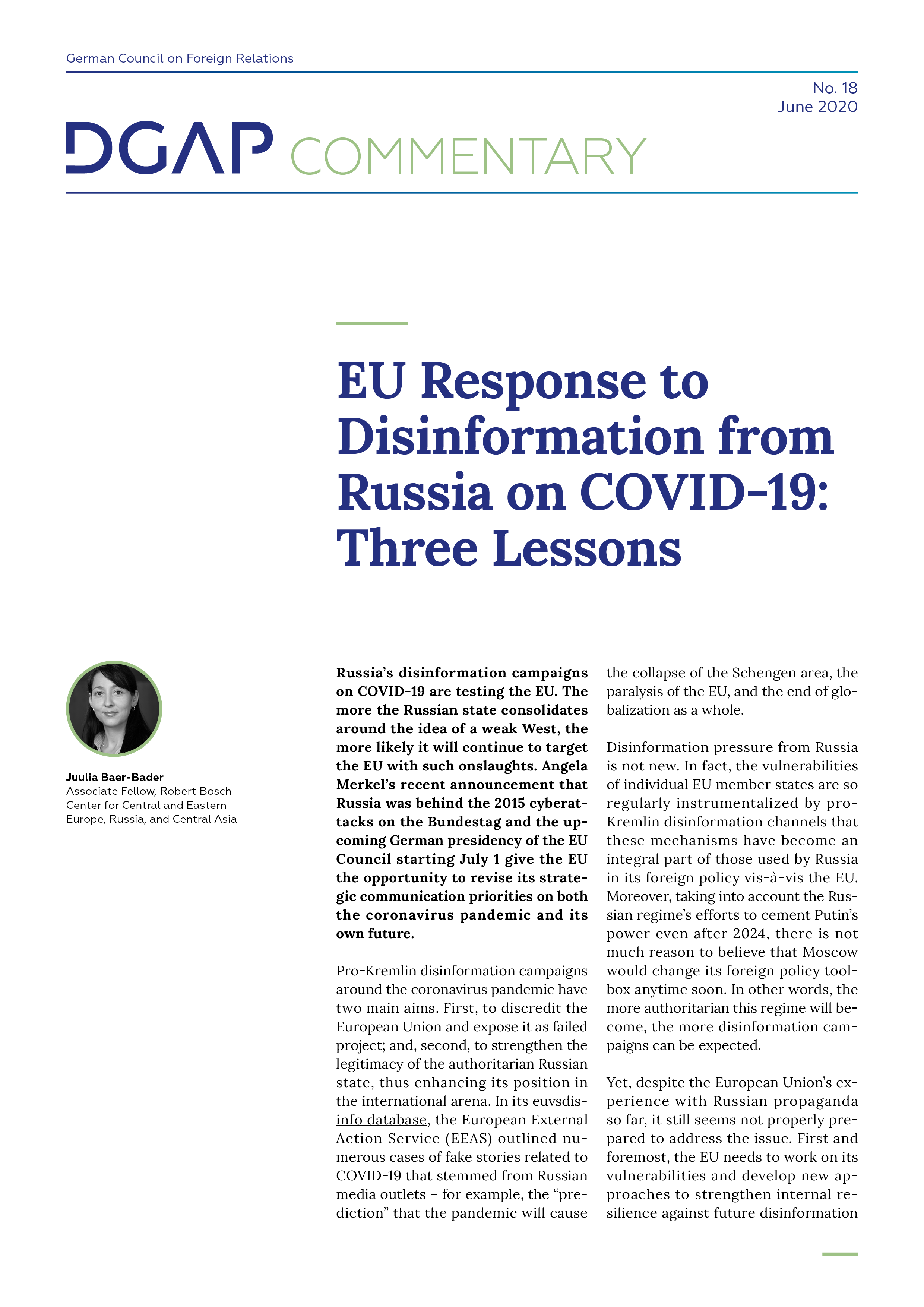Pro-Kremlin disinformation campaigns around the coronavirus pandemic have two main aims. First, to discredit the European Union and expose it as failed project; and, second, to strengthen the legitimacy of the authoritarian Russian state, thus enhancing its position in the international arena. In its euvsdisinfo database, the European External Action Service (EEAS) outlined numerous cases of fake stories related to COVID-19 that stemmed from Russian media outlets – for example, the “prediction” that the pandemic will cause the collapse of the Schengen area, the paralysis of the EU, and the end of globalization as a whole.
Disinformation pressure from Russia is not new. In fact, the vulnerabilities of individual EU member states are so regularly instrumentalized by pro-Kremlin disinformation channels that these mechanisms have become an integral part of those used by Russia in its foreign policy vis-à-vis the EU. Moreover, taking into account the Russian regime’s efforts to cement Putin’s power even after 2024, there is not much reason to believe that Moscow would change its foreign policy toolbox anytime soon. In other words, the more authoritarian this regime will become, the more disinformation campaigns can be expected.
Yet, despite the European Union’s experience with Russian propaganda so far, it still seems not properly prepared to address the issue. First and foremost, the EU needs to work on its vulnerabilities and develop new approaches to strengthen internal resilience against future disinformation attacks. In May 2020, German Chancellor Angela Merkel provided the EU with momentum for reevaluating its current strategic approach to countering such interventions when she announced that she had hard evidence that Russia was responsible for the cyberattacks on the German Bundestag in 2015 – a marked sharpening of the official tone. Germany and the EU should consider three lessons in order to build on this momentum.
Lesson 1: Debunking Alone Is Not Enough
The strategic communications team of EEAS, which focuses on fact-based communication and countering disinformation, is important for damage control and needs to be continued. Its debunking strategy may, however, become ineffective when accurate fact-based information is more complex than the false information already available in the media space. Psychology research on debunking reveals that people tend to accept the information that corresponds to their world views and preexisting attitudes and, thus, are highly skeptical of contrasting information. Debunking becomes particularly challenging when it tries to counter political misinformation because discussions around such topics may become highly emotional.
The biggest challenge to correcting false statements by debunking is the persistence of human memory. The influence of false information remains even if it has been corrected. Researchers call this phenomenon “continued influence effect,” which is one of the main reasons why an evidence-based approach fails to correct a false narrative.
The EU’s slow response to assisting Italy, for example, created fruitful ground for misinterpretation – in the eyes of vulnerable populations, it made the EU look like it was part of the problem rather than the solution. Eighty-eight percent of respondents to a Monitor Italia survey, which was carried out in collaboration with the Dire Agency and Tecnè from March 12 to 13, 2020, believed that the EU was not helping Italy. In reality, however, the EU provided an aid scheme to Italy worth up to €200 billion.
At the same time, Russia was fast to respond to foreign requests for aid although its response to the economic impact of the coronavirus pandemic at home was cumbersome. Supported by an intensive promotion campaign, Russia filled the empty communication niche left by the EU with suitable narratives composed of its delivery of military medical aid convoys.
While the Russian ambassador to Italy provided a long list of equipment delivered, he did not provide any data on their actual value. Meanwhile, the Italian daily La Stampa reported that 80 percent of Russian support was of no use to the country. Still, the narrative that Russia supported Italians more than the EU persists in the Italian population. According to a public opinion poll conducted by the research institute SWG between March 20 and April 12, 2020, on which countries Italians consider “friends,” Russia received approval by 32 percent of respondents. This is an increase of 17 percent in comparison to 2019. The same 2020 poll identifies Germany as Italy’s leading “foe” as indicated by 45 percent of respondents, followed by France (38 percent) and United Kingdom (17 percent). Although the EU is currently providing Italy with the most support, it has chosen the wrong approach to convey its message.
The core focus of the EU’s strategic communications should, therefore, be a proactive approach or “pre-bunking.” EEAS and the European Commission’s Directorate-General for Communication (DG COMM) need to develop new operational structures to create and spread trustworthy European narratives – in general but particularly in times of crisis. Had the EU been able to efficiently communicate the massive value of its assistance package to the Italians from early on, it would have put the Russian narrative into perspective and have allowed for a fair comparison of the scope of aid provided.
Lesson 2: Strengthen and Leverage Regional Cooperation in the Fight Against COVID-19
Regional ties and cooperation may play a crucial role in assuring people that a crisis is being addressed as it happens. Because such cooperation can also continue to be believed in after a crisis ends, it should be strengthened with all available means.
It was highly appreciated, for example, when German Federal States announced that they would host COVID-19 patients from Italy and France in their hospitals, and when other EU states sent medical equipment to Italy. The coronavirus crisis was also a fitting time for the Estonian Ministry of Education to start sharing all of its digital education tools to support other countries’ education systems.
Unfortunately, these success stories remained largely within their regional contexts and did not have a pan-European impact. Hence, in order to strengthen both regional cooperation projects and the EU’s resilience against COVID-related disinformation, successful regional actions should be given EU-level visibility. In practice, European leaders should streamline their communications and actively point out the successes that the EU has achieved.
Lesson 3: Increase Trust by Bold Demonstrative Gestures
The Italian public’s level of trust in the EU and some of its member states, including Germany, has changed for the worse. According to data collected by SWG and reported in Italian news, Italians’ trust in the EU has fallen from 42 percent last September to 27 percent this April. Over that same period, trust in the European Commission decreased from 41 to 24 percent and in the European Central Bank from 43 to 25 percent.
It will certainly not be easy for the EU to reconcile with Italy and diminish the growing gap in the north-south division of EU member states. Bold political gestures may, however, help to restore trust. One of the most memorable moments in European history was the Warschauer Kniefall, a gesture of humility and penance by West German Chancellor Willy Brandt to bridge the sorrow and frustration in (political) relations between West Germany and Poland. Once the acute initial phase of the coronavirus pandemic is over, Germany along with other EU member states should, perhaps, initiate a collective EU commemoration to both honor the victims of the virus and shift the focus toward the future of the European Union. The upcoming German presidency of the EU Council that starts on July 1 could be a suitable moment for such a suggestion.
If the European Commission intends to maintain its ambition of being a “geopolitical Commission,” it needs to be based in a strong and resilient European Union – one that is ready to back its decisions and respond in one voice to the external challenges posed by Russia. For this, the EU needs to change its reactive strategy. Instead, it should proactively build on its own successes, thereby also addressing growing internal contradictions.

